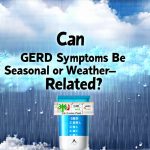Gastroesophageal reflux disease (GERD) impacts millions worldwide, manifesting as frequent heartburn, regurgitation, and difficulty swallowing. While often associated with dietary triggers and lifestyle factors, the relationship between GERD and environmental conditions – specifically, breathing cold air – is a less discussed but significant aspect for many sufferers. The sensation of irritation or exacerbation of GERD symptoms when exposed to colder temperatures isn’t simply anecdotal; it’s rooted in physiological mechanisms that can amplify acid reflux and esophageal sensitivity. Understanding this interplay allows individuals with GERD to better manage their condition and mitigate discomfort, particularly during seasonal changes or in colder climates.
The seemingly simple act of inhaling cold air sets off a cascade of events within the body that can directly affect those prone to reflux. Cold air causes a constriction of the airways and esophagus, increasing pressure within the abdominal cavity. This, combined with potential alterations in lower esophageal sphincter (LES) function, creates an environment where stomach acid is more likely to travel upwards. Furthermore, cold temperatures can heighten nerve sensitivity, making individuals more aware of even mild reflux episodes, perceiving them as more intense or troublesome than they might otherwise be. It’s a complex interaction between physical responses and perceived discomfort that deserves closer examination. Understanding how conditions like GERD and hiccups can affect your daily life is the first step to managing it.
The Physiological Link Between Cold Air & GERD
The connection isn’t about the cold air itself being acidic; it’s about how the body reacts to it, and how those reactions can worsen reflux symptoms. When you breathe in cold air, your body instinctively tries to warm it up before it reaches your lungs. This warming process happens in the airways and esophagus, leading to several changes that are relevant for GERD sufferers:
- Constriction of bronchial tubes: This reduces airflow and increases pressure in the chest cavity.
- Esophageal Spasm: The muscles of the esophagus may contract involuntarily in response to the temperature change, potentially pushing stomach contents upwards.
- Increased Abdominal Pressure: Cold air inhalation can trigger a reflex that momentarily increases abdominal pressure, which is already a factor in GERD.
These factors combine to create conditions ripe for acid reflux. A weakened or relaxed LES – the valve between the esophagus and stomach – then struggles to contain stomach acid, leading to heartburn and other symptoms. Even individuals with well-managed GERD may experience a flare-up simply from spending time outdoors on a cold day. The severity of these effects can also be linked to individual sensitivity; some people are more prone to esophageal spasms or have a naturally weaker LES. Understanding the different types of GERD, such as K21.0 — GERD with esophagitis, can help you understand your specific condition.
The heightened awareness of reflux is equally important. Cold temperatures generally increase nerve sensitivity, meaning the esophagus becomes more receptive to even small amounts of acid. This phenomenon explains why a minor episode of reflux might feel significantly worse in cold weather than it would at other times. It’s not necessarily more acid, but rather increased perception of that acid. GERD and bad breath are also common issues to be aware of.
Managing GERD Symptoms in Cold Weather
Proactive management is key when facing colder temperatures and potential GERD exacerbation. It’s about minimizing the physiological triggers and bolstering your body’s defenses against reflux. Lifestyle adjustments play a huge role:
- Dietary Considerations: Continue to avoid known GERD trigger foods, such as fatty foods, spicy foods, chocolate, caffeine, and alcohol. These can worsen symptoms even without cold air exposure.
- Layered Clothing: Keeping the core warm helps regulate body temperature and potentially reduces esophageal spasms.
- Breathing Techniques: Consciously practicing slow, deep breaths can help regulate abdominal pressure and minimize discomfort during inhalation of cold air.
Beyond these general tips, there are specific strategies to mitigate the effects of cold air. For instance, wearing a scarf over your mouth and nose while outdoors can warm the air before it enters your respiratory system, reducing the immediate temperature shock. Small changes like this can make a surprising difference in symptom management. Furthermore, recognizing your personal triggers is crucial; if you consistently experience symptoms after being exposed to cold air for a specific duration, adjust your activities accordingly. Looking at dinner meals for GERD and IBS can help plan ahead.
Identifying Your Personal Triggers
Understanding your GERD is paramount. What works for one person might not work for another, so careful self-observation is essential:
- Keep a symptom diary: Record when you experience flare-ups, what you ate beforehand, the temperature and weather conditions, and any activities you were engaged in.
- Pay attention to timing: Do symptoms appear immediately after cold air exposure, or are they delayed? This can help pinpoint the specific trigger.
- Note the severity: How intense is the discomfort? Is it mild heartburn, severe chest pain, or something else entirely?
This detailed record will reveal patterns and allow you to anticipate potential problems. For example, you might discover that running outdoors in cold weather consistently triggers symptoms, while simply walking doesn’t. This information empowers you to modify your behavior and reduce your exposure to triggers. Remember that individual sensitivities vary considerably, so a personalized approach is vital for effective management.
The Role of Esophageal Sensitivity
As mentioned earlier, increased nerve sensitivity plays a significant role in how GERD symptoms are experienced in cold weather. This isn’t just about the amount of acid; it’s about how your nerves interpret that acid:
- Visceral hypersensitivity: Some individuals have an abnormally heightened sensitivity to normal digestive processes, leading to discomfort even with minimal reflux.
- Neurological pathways: Cold temperatures can directly affect neurological pathways involved in pain perception, making the esophagus more sensitive.
- Inflammation: Chronic GERD can lead to inflammation of the esophageal lining, further increasing nerve sensitivity and lowering the threshold for experiencing discomfort.
If you suspect heightened sensitivity is a factor, discussing this with your healthcare provider might be beneficial. While there aren’t specific treatments for hypersensitivity itself, understanding the role it plays allows you to focus on minimizing triggers and managing symptoms more effectively. It also highlights why simply reducing acid production isn’t always enough; addressing nerve sensitivity can significantly improve quality of life for those with GERD. GERD and swallowing difficulties are often linked to heightened esophageal sensitivity.
Practical Strategies for Minimizing Irritation
Beyond dietary changes and layered clothing, there are several practical steps you can take to reduce irritation while breathing cold air:
- Warm the Air You Breathe: As mentioned previously, wearing a scarf or mask over your mouth and nose helps warm the air before it enters your respiratory system.
- Avoid Rapid Temperature Changes: Transitioning quickly from a warm indoor environment to a cold outdoor one can shock the system and exacerbate symptoms. Allow yourself time to adjust gradually.
- Stay Hydrated: Drinking plenty of water helps maintain healthy esophageal function and dilutes stomach acid, potentially reducing irritation.
- Consider Indoor Air Quality: Dry indoor air can also irritate the esophagus. Using a humidifier can help maintain moisture levels and reduce discomfort.
- Maintain a Healthy Weight: Obesity can increase abdominal pressure and contribute to GERD symptoms. Maintaining a healthy weight can alleviate these pressures.
These strategies, combined with consistent medical care, empower individuals with GERD to navigate colder weather without significant disruption to their daily lives. It’s about understanding the interplay between your body, the environment, and your condition, and then taking proactive steps to minimize discomfort and maintain well-being. Remember tips for avoiding liver stress during cold and flu season can also help support overall health.


















